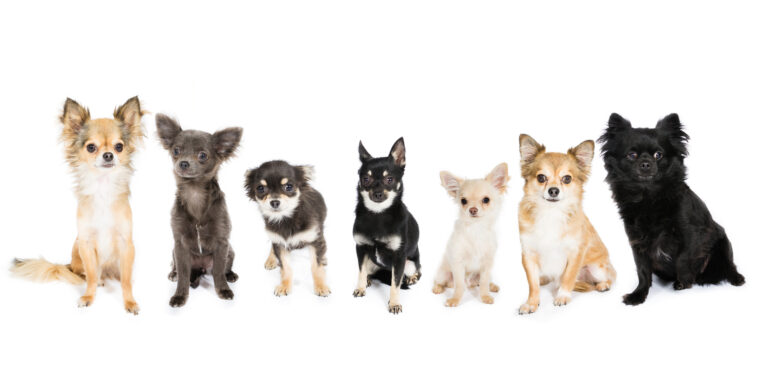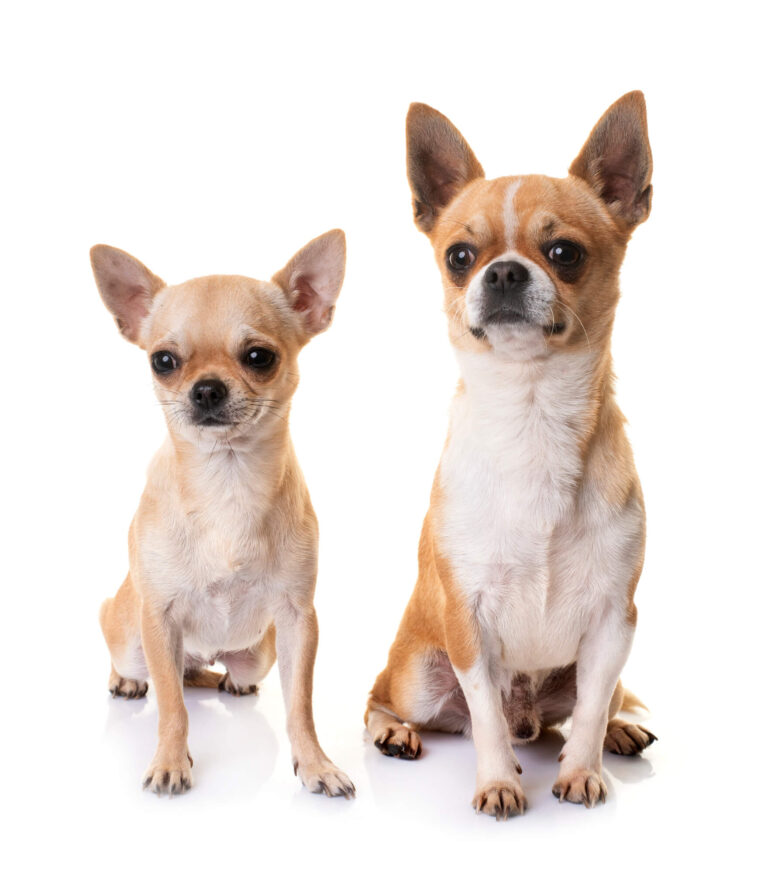Short-Haired Chihuahuas: The Ultimate Guide
If you’re looking for a small dog that’s easy to care for, a short-haired Chihuahua could be a great choice.
These tiny dogs are known for their larger-than-life personalities and make great companions for apartment dwellers or those with small backyards.
As owners of a short-haired rescue Chihuahua named Leo, we’ve learned firsthand how to best care for these tiny pups.
We can attest to their easy maintenance and lovable personalities.
In this blog post, we will share our experience and tips on getting and caring for a short-haired Chihuahua so you can decide if this is the right dog for you.
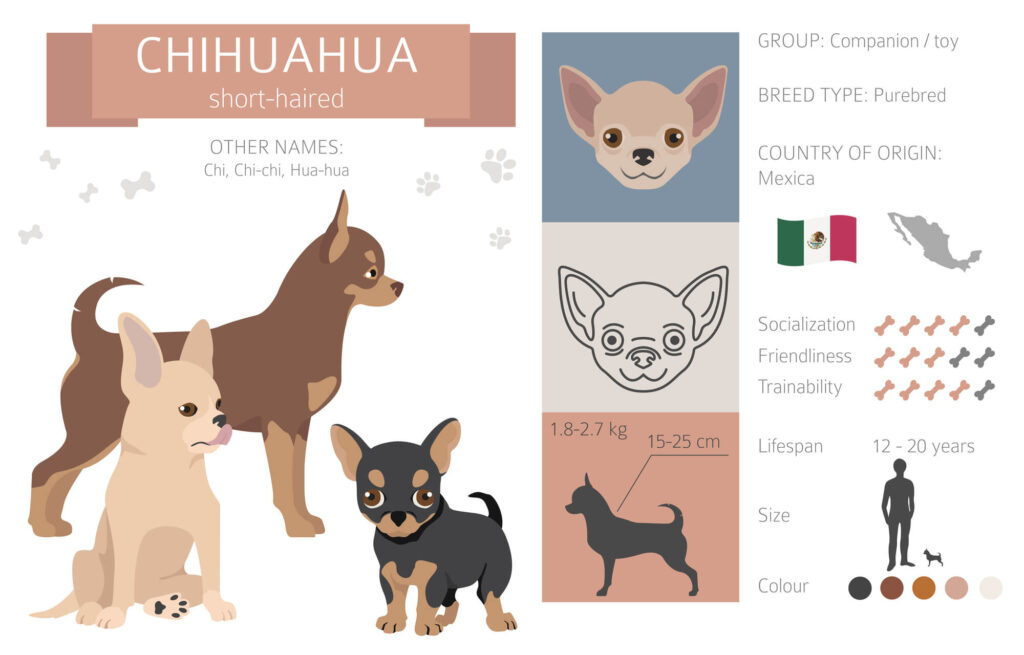
Origin
Chihuahuas originated in Mexico.
They are believed to be descendants of the Techichi, a small breed of dog kept by the Toltec people of Mexico over a thousand years ago.
The Chihuahua’s small size and affectionate nature made them popular as companion dogs, and they were eventually brought to the United States in the late 19th century.
Interestingly, there are 7 types of Chihuahuas, with the two officially recognized varieties being short-haired Chihuahuas and long-haired Chihuahuas.
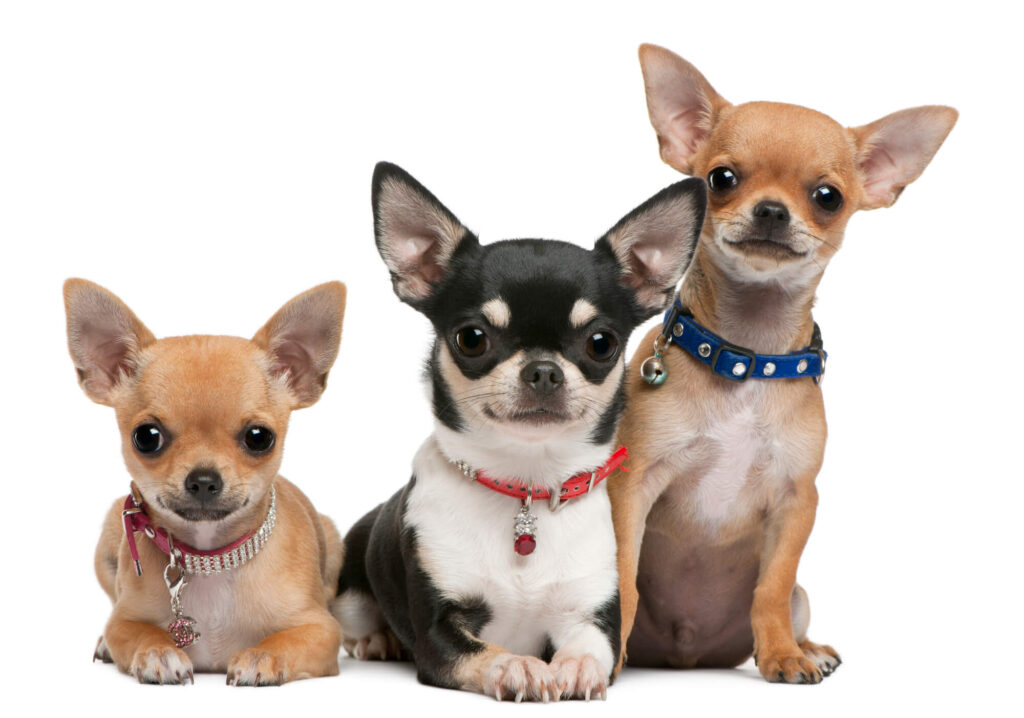
Appearance
Head: can have a round, dome appearance (apple-head Chihuahua) or a flatter head with a longer, tapered snout (deer-head Chihuahua)
Eyes: can be very big and round (apple-head Chihuahua) or more almond-like (deer-head Chihuahua)
Size: they typically weigh 3 – 6 lbs and stand 5 – 8 inches tall at the shoulder
Ears: large, erect ears. Sometimes one or both ears can be floppy
Coat: a smooth and close-lying coat coat that is no longer than 1 inch. The hair is fine, soft, and velvety to the touch. It has a sleek, glossy appearance.
Colors: Chihuahuas come in a wide range of colors and markings. The American Kennel Club (AKC) recognizes 9 standard colors for Chihuahuas and 6 markings.
Standard colors recognized by the AKC:
- Black
- Black and tan
- Blue and tan
- Chocolate
- Chocolate and tan
- Cream
- Fawn
- Fawn and white
- Red
Standard markings recognized by the AKC:
- Black brindling
- Black mask
- Black sabling
- Spotted on white
- White markings
- Merle markings
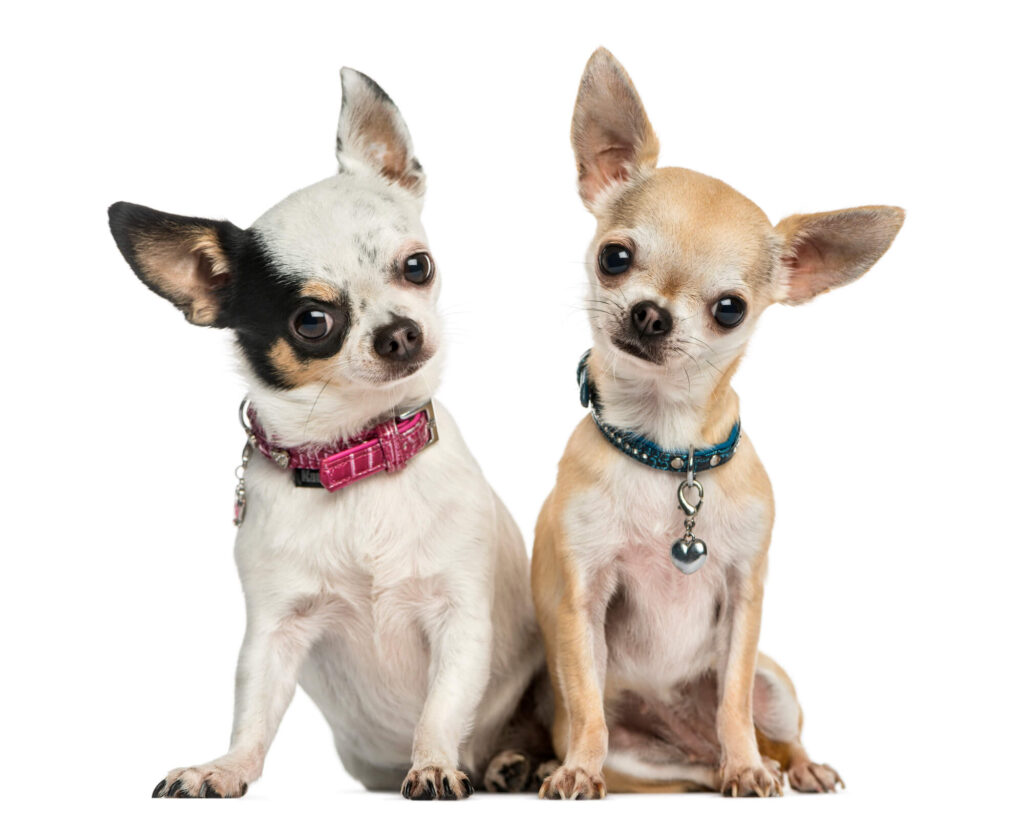
Temperament
Short-haired Chihuahuas are like little bundles of energy and sass.
They’re super loyal and love to cuddle up in your lap. They are usually a one-person dog.
They’ll practically become your little shadow, following you around wherever you go.
People describe them as lively, alert, and bold, but they can also be stubborn or timid.
Chihuahuas are not typically recommended for families with young children because they can be easily injured due to their small size.
Some Chihuahuas can get a little nervous around fast-moving kiddos.
They also tend to be wary of strangers and may exhibit reactive behavior towards unfamiliar people or animals.
Introducing them to different people and situations from a young age is a real game-changer to ensure they’re friendly and well-behaved.
Chihuahuas can be prone to excessive barking.
If you don’t mind the barking, they make fantastic little guard dogs, always ready to alert you to anything unusual.
Overall, short-haired Chihuahuas are fantastic companions, but they’re best suited for owners who appreciate their unique blend of spunk and affection.
Health and Lifespan
Common Health Issues
Like all dog breeds, Chihuahuas are prone to certain health issues. Some of the most common health issues that they face are listed below.
- Dental Problems: Chihuahuas are prone to dental issues such as gum disease and tooth loss. Brushing regularly and chews will help prevent these issues.
- Hypoglycemia: Chihuahuas have a high metabolism and are prone to low blood sugar levels, which can lead to seizures and other health issues. Small frequent meals and exercise can help prevent hypoglycemia.
- Patellar Luxation: This is a condition where the kneecap moves out of its normal position, causing pain and discomfort. Watch for limping or favoring one leg and consult a vet if you notice this.
- Collapsed Trachea: This is a condition that makes it difficult for a dog to breathe. If your Chihuahua coughs or has breathing troubles, seek immediate veterinary attention. This is different from reverse sneezing, which is harmless.
- Eye Problems: Chihuahuas can frequently encounter eye troubles, including conditions like cataracts, glaucoma, and dry eyes. It’s vital to stay on top of their eye health with regular vet check-ups. Keep an eye out for any signs like redness or unusual discharge to catch and address issues early.
Average Lifespan
On average, short-haired Chihuahuas tend to live for about 12 to 20 years.
But here’s the kicker—with the right care and attention, some of these little guys have been known to push the boundaries and live beyond the ripe old age of 20.
Spike, the oldest Chihuahua on record, lived to be 23 years old!
Regular vet check-ups, a balanced diet, and a daily dose of exercise are the secret sauce to keeping your Chihuahua in tip-top shape and wagging their tail happily for many years to come.
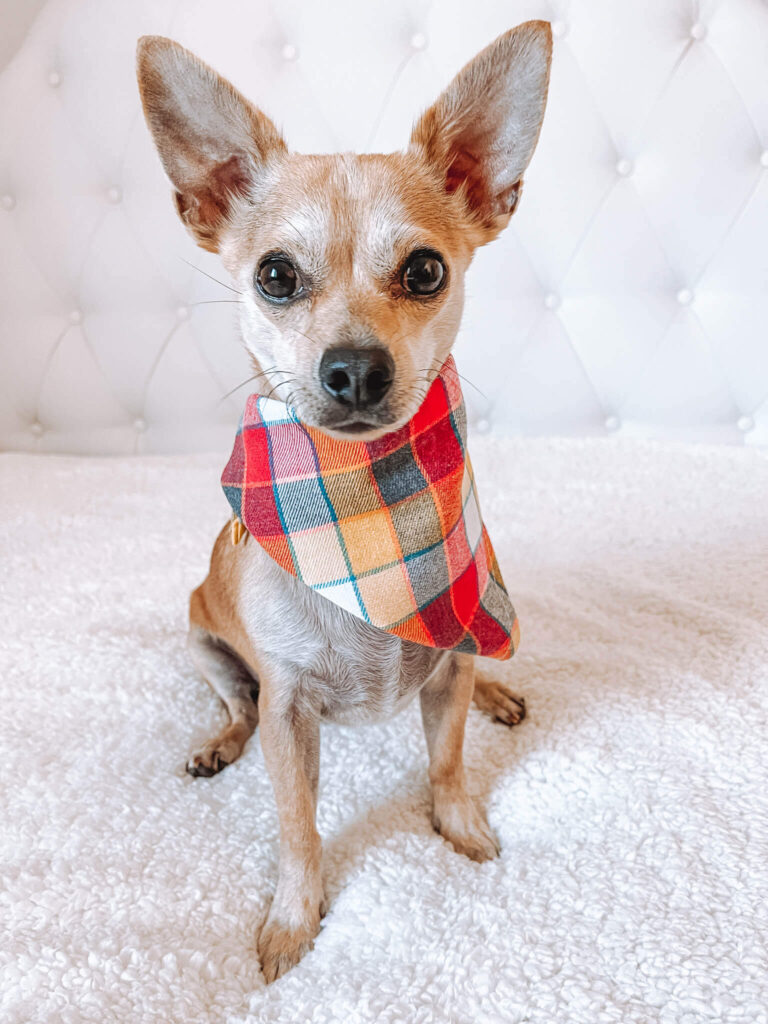
Care and Maintenance
Dietary Requirements
These little bundles of energy have a fast metabolism and require a high-quality diet rich in protein, which means they need a diet that packs a punch.
Opt for a high-quality dog food that’s rich in protein and free from fillers and by-products.
Feeding short-haired Chihuahuas 3-4 small meals a day is often recommended to help prevent hypoglycemia. This helps keep their blood sugar levels more consistent throughout the day.
It’s tempting to spoil your Chihuahua with treats, but be cautious.
Too many treats or overfeeding can quickly lead to weight issues, and Chihuahuas are prone to packing on the pounds.
So, remember, when it comes to their diet, quality and moderation are the key.
Tip: keep track of your Chihuahua’s weight. Overfeeding or underfeeding can lead to health problems.
Exercise Needs
Short-haired Chihuahuas are little dynamos brimming with energy and need regular exercise to maintain their health.
A daily walk or play session should be on your Chihuahua’s agenda to keep them engaged and active.
However, it’s crucial to strike the right balance.
Chihuahuas, due to their petite size, can be susceptible to joint problems, so it’s essential not to overdo it with their exercise routines.
Tip: our exercise post is a treasure trove of tips and even includes a sample fitness plan. You can even include fun games as exercise!
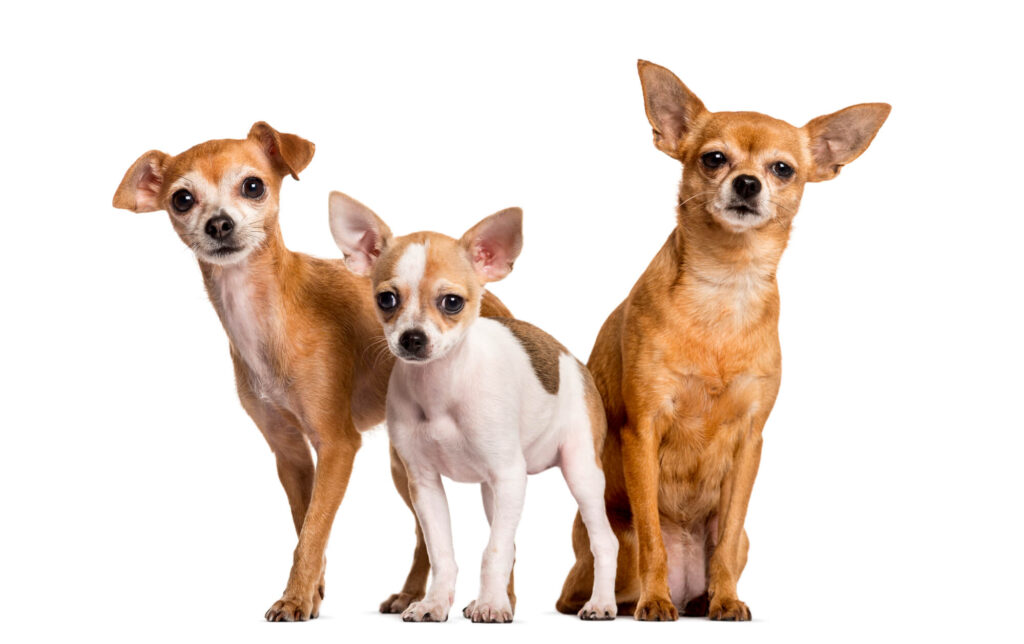
Grooming Tips
Grooming your short-haired Chihuahua is a breeze compared to high-maintenance breeds.
Bathing them somewhere between every 1 to 6 weeks will keep their coat looking its absolute best.
A weekly brushing session is your secret weapon to remove loose hair and maintain that glossy, healthy coat.
Not only does this keep them looking sharp, but it also reduces shedding around your home.
Don’t forget those cute ears! Regular ear cleaning is crucial to prevent pesky ear infections.
Regular nail trims are a must to ensure they don’t cause any discomfort or issues.
Tips: consider using a grinder instead of nail clippers. And if you really want to turn nail time into a treat, smear some peanut butter on a lick mat to distract and delight your pup.
Shedding
Short-haired Chihuahuas shed moderately year-round and it’s important to note that they are not hypoallergenic.
But fear not, there are tricks to keep that loose hair in check.
Regular brushing sessions with your Chihuahua and using a de-shedding shampoo can work wonders in minimizing shedding.
With a little grooming and some home maintenance, you can enjoy the company of your short-haired Chihuahua without turning your living space into a fur-filled wonderland.
Tip: Vacuuming frequently, having lint rollers on hand, and using an air purifier will help keep loose hair down in your home.
Space Requirements
When it comes to space requirements, short-haired Chihuahuas are the kings and queens of adaptability.
These tiny dogs are perfectly suited for small living spaces, like apartments.
Here’s the secret to keeping them entertained even in tight quarters – puzzles and interactive toys.
These can be used with minimal space, making sure your Chihuahua gets their mental exercise, which can tire them out just as much as physical exercise!
Tip: many of these boredom-buster games can be played indoors with minimal space.

Socialization
Socialization is key when it comes to short-haired Chihuahuas.
These tiny pups can be a bit wary of the big, wide world if they aren’t introduced properly.
Because, let’s face it, when you’re small, everything else seems big and scary.
The key to raising a confident and well-adjusted Chihuahua is exposure.
From an early age, introduce them to different people, animals, and environments. Let them know that the world is not such a scary place after all.
Here’s the secret sauce – opt for positive reinforcement in your Chihuahua’s training. With this approach, you’ll end up with a well-behaved confident sidekick.
Training
Training your short-haired Chihuahua is entirely doable, given their level of intelligence, but be prepared for a dash of stubbornness and independence.
Patience and consistency are the name of the game when it comes to Chihuahua training, and it’s best to kickstart it as early as you can, using positive reinforcement with treats and praise.
These smart little dogs can pick up things pretty quickly so by starting early, you can set good habits from the start.
If you’re considering adopting an older dog, don’t worry, it’s not too late.
We rescued our Chihuahua when he was already 2 years old. He didn’t even know his own name or any commands and now he knows lots of tricks.
So don’t fret, these clever pups can still learn and adapt surprisingly well.

Pros and Cons of Short-Haired Chihuahuas
Like any dog breed, Chihuahuas come with their own set of pros and cons.
Here are some things to consider before bringing a short-haired Chihuahua into your home.
Pros
- Low Maintenance: Short-haired Chihuahuas are a breeze when it comes to grooming, especially compared to their long-haired counterparts.
- Easy to Train: These dogs are intelligent and eager to please, which makes them relatively easy to train. They respond well to positive reinforcement and can learn a variety of commands and tricks.
Affectionate: They thrive on cuddling and being close to their owners, earning them the title of great lap dogs. - Fashionable clothing: These pups can get chilly easily, making them the perfect canvas for some stylish doggy outfits!
Cons
- Fragile: Short-haired Chihuahuas are small and delicate, which makes them prone to injury. They can easily be hurt by rough play or accidental falls, so they may not be the best choice for families with young children.
- High Energy: These little dogs may be small, but they have a lot of energy. Short-haired Chihuahuas require regular exercise and playtime to stay happy and healthy. Without adequate physical and mental stimulation, they can become destructive or whiny.
- Prone to Certain Health Issues: Short-haired Chihuahuas are prone to a variety of health issues, including dental problems, eye issues, and tracheal collapse. They may also suffer from joint problems like patellar luxation as they age.
- Long lifespan: While a long lifespan can be seen as a pro, it also means a long-term commitment. Chihuahuas can live up to 20 years, so potential owners should be prepared for a substantial and lasting investment of time and care.
Finding a Short-Haired Chihuahua
If you are interested in getting a short-haired Chihuahua, there are two main ways to obtain one: adoption or purchasing from a breeder.
Here are some things to consider when deciding which option is best for you.
Adoption
Adopting a short-haired Chihuahua can be a great way to give a loving home to a dog in need. There are many animal shelters and rescue organizations that have Chihuahuas available for adoption. Some things to keep in mind when adopting a dog include:
- Adoption fees: These fees can vary depending on the organization, but they often cover spaying/neutering, vaccinations, and other medical expenses.
- Temperament: Make sure to spend some time with the dog before adopting to ensure that their temperament is a good fit for your lifestyle.
- History: Ask the organization if they have any information on the dog’s background, such as whether they were previously house-trained or if they have any medical issues. Most of the time, you won’t know much about the dog’s past.
Petfinder is a fantastic resource to find an adoptable Chihuahua near you.
Some top Chihuahua rescues are:
- Second Chance Chi – Salt Lake City, UT
- Chihuahua Rescue & Transport – many states
- Ay Chihuahua Rescue – Austin, TX
Breeder
If you decide to purchase a short-haired Chihuahua from a breeder, there are a few things to keep in mind:
- Reputation: Do your research to find a reputable breeder who prioritizes the health and well-being of their dogs. Don’t support backyard breeders.
- Health: Make sure the breeder has had the dog’s health checked by a veterinarian and can provide documentation of any necessary vaccinations and tests.
- Cost: Purchasing a dog from a breeder can be more expensive than adopting, so be prepared to pay a higher price, up to $2,500.
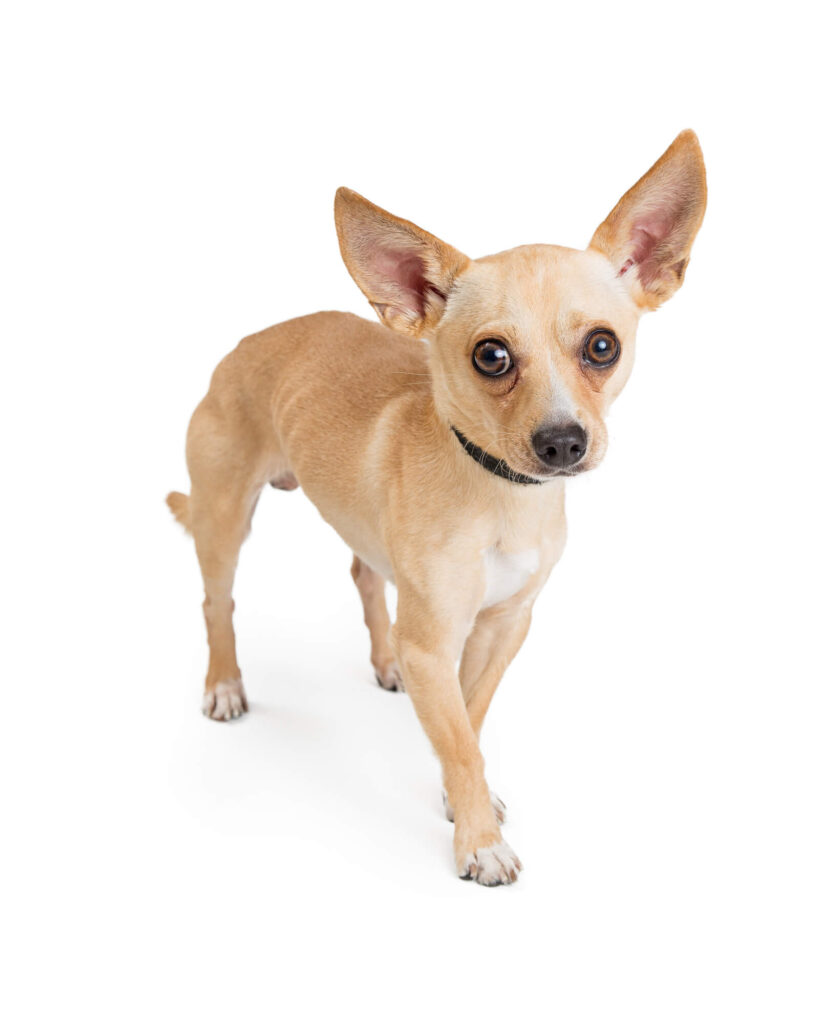
Preparing to Bring Home a Chihuahua
If you are going to be a first-time dog owner, you will need to Chihuahua-proof your home and gather the necessary supplies.
Here are some key considerations:
- Chihuahua-Proof Your Home: Just like with a human baby, you’ll want to make sure your home is safe for your Chihuahua. Remove any potential hazards or items that could be harmful if chewed or ingested. This includes small objects, toxic plants, chemicals, and accessible cords.
- Designate a Safe Space: Create a designated area in your home for your Chihuahua to eat, sleep, and play. This space can include a cozy bed, food and water dishes, and some toys.
- Gather Necessary Supplies: Before bringing your Chihuahua home, make sure you have all the essential supplies. These include high-quality dog food, food and water dishes, a leash and harness, poop bags, an identification tag, a dog bed, a crate, and a dog car seat.
- Grooming tools: Chihuahuas have a short coat that requires minimal grooming, but it’s still important to invest in the proper tools, such as a soft-bristled brush, nail clippers, dog shampoo, and ear cleaner.
- Dog-Proof Your Yard: If you have outdoor space, ensure that it’s securely fenced to prevent your Chihuahua from wandering off. Check for any gaps or openings in the fence that they could squeeze through.
- Potty area and schedule: Designate a specific area for your pup to use the bathroom, such as a pee pad or a section of your yard. Be consistent with their potty schedule and reward them for successful bathroom trips.
- Vet Visit: Schedule a veterinary check-up shortly after bringing your Chihuahua home. This establishes a baseline for their health and ensures they are up to date on vaccinations and preventive care.
- Socialization: Gradually introduce your Chihuahua to different people, animals, and environments to promote socialization and build their confidence.
Summary
If you’re looking for a pint-sized pup with a big personality, a short-haired Chihuahua might be the perfect fit for you.
In this guide, we covered everything from their appearance and temperament to how to care for them.
We dished out the pros and cons of having one of these little bundles of energy in your life and even spilled the beans on where to find your very own Chihuahua.
With the right care and attention, these little pups can make wonderful companions.
FAQs
What Is the Difference Between a Short-Haired Chihuahua and a Long-Haired Chihuahua?
Short-haired Chihuahuas have a short, smooth coat that is low maintenance. Long-haired Chihuahuas have a longer, flowing coat that requires more grooming.
How Much Does a Short-haired Chihuahua Cost?
The price of a short-haired Chihuahua can vary depending on several factors, such as the breeder, pedigree, and color. On average, you can expect to pay between $500 to $2,500 for a short-haired Chihuahua puppy. Adopting a Chihuahua will cost less.
Are Short-Haired Chihuahuas Hypoallergenic?
No, short-haired Chihuahuas are not hypoallergenic. They do shed, although their shedding is not as excessive as some other breeds. If you have allergies, it is recommended that you spend some time with a Chihuahua before adopting one to see if you have any allergic reactions.
Do Short-Haired Chihuahuas Need Haircuts?
No, short-haired Chihuahuas typically do not need haircuts in the same way that long-haired breeds do. Their short coat naturally stays quite low-maintenance.
Related posts:
- 7 Types of Chihuahuas: Full Guide With Pictures
- Long-Haired Chihuahuas: The Ultimate Guide
- The 5 Rarest Chihuahua Colors + Pictures
- Apple-Head Chihuahuas: The Ultimate Guide
- Deer Head Chihuahuas: The Ultimate Guide
- How Big is a Chihuahua’s Heart? (+ 7 Heart Health Tips)
- 6 Best Beds for Chihuahuas (2023)
- 5 Best Dog Treats for Chihuahuas in 2023 (Healthy)


